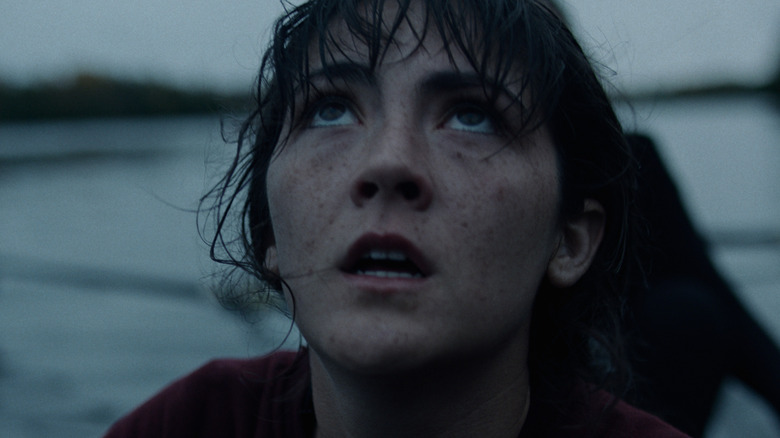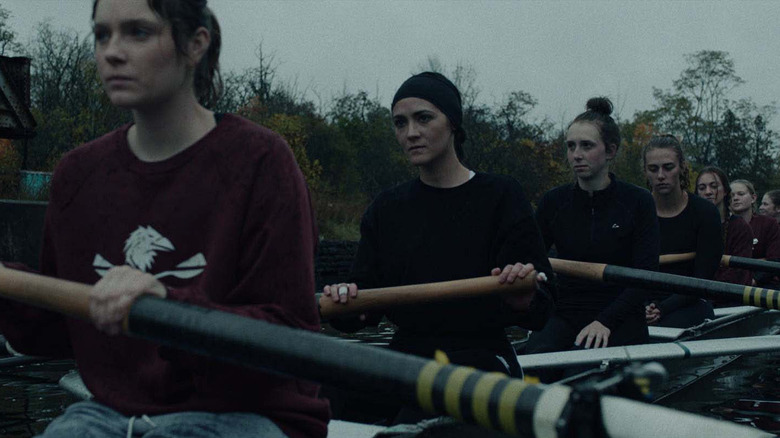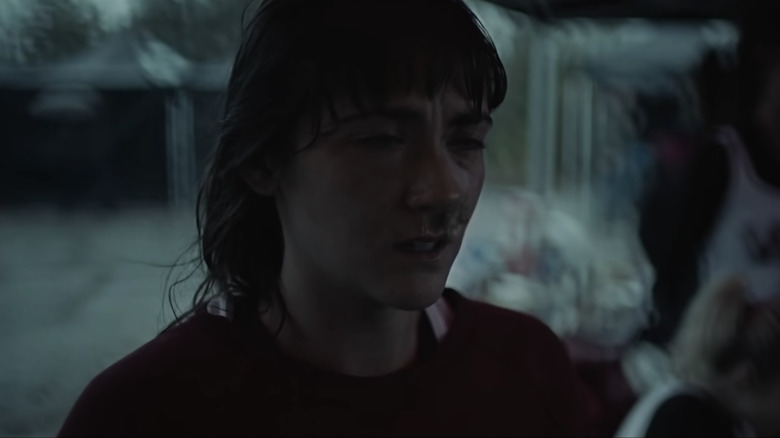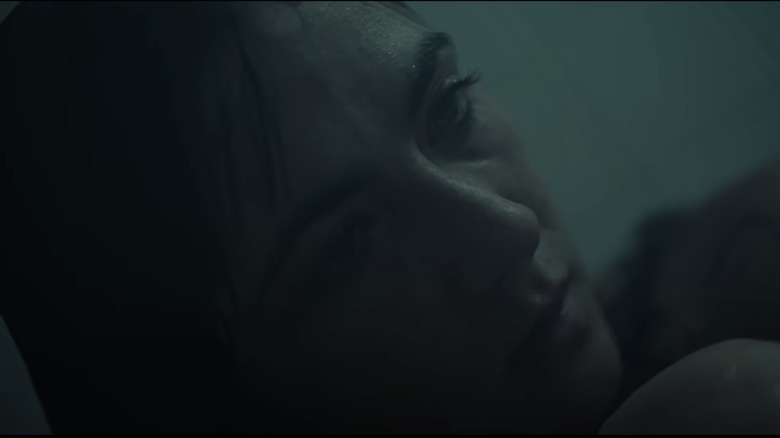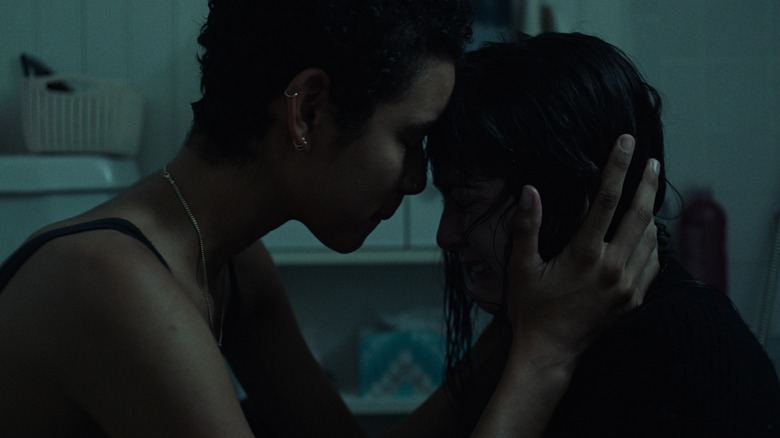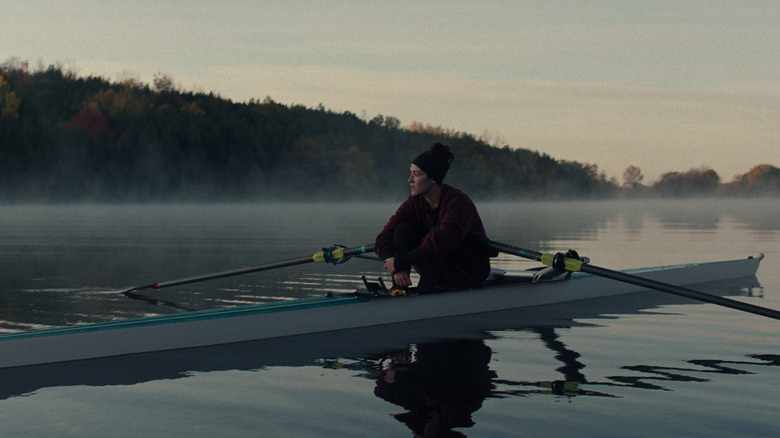The Novice Director Lauren Hadaway Threw Herself Into The Deep End For Her First Feature Film [Interview]
For her first feature film, Lauren Hadaway embraced the age-old advice, write what you know. A combination of her relentless ambition, past relationships and the traumatic experience of being a collegiate rower were rolled into one, leading her to produce and direct "The Novice," a brutal journey into the mind of Alex Dall (Isabelle Fuhrman), a freshman college student who becomes obsessed with rowing. Alex' journey is both physical and psychological, as she pushes well past her limits, alienating everyone around her in the process — but the better she gets, the less her dark reality troubles her. And given much of the source material was herself — if not the experiences of other rowers she knew — Hadaway had plenty to pull from, but also a complex challenge to conquer: bringing the audience into her headspace.
Rowing, you'll discover upon watching the film, isn't nearly as graceful as it seems. Fuhrman spoke to /Film about the grueling and bloody experience of learning the sport for her role, something Hadaway also experienced firsthand. From a distance, boats gliding across the water whilst a team moves in unison seems simple, but "The Novice," brings us in close: sweat, tears, blood, blisters, and all. Hadaway pulled from everything in her toolbox to immerse the audience in Alex's experience. The writing and visuals were the first step, but Hadaway also has a background in sound design which very much came in handy. Perhaps you've heard of her prior work — she was a sound effects editor on Quentin Tarantino's "The Hateful Eight," a sound editor on Damien Chazelle's "Whiplash," and a dialogue supervisor on a little movie called "Justice League," (including the infamous Snyder Cut).
So how did sound factor into "The Novice"? Hadway got creative, using her prior experience in finessing sound to communicate the psychology of her character. Or, as Hadaway put it, "You can f*** with the audience on a subliminal level." In our conversation, Hadaway talks through her approach to creating the world of Alex Dall, the many tribulations of shooting a film out on the water and the impact of time spent with an impressive roster of directors.
This interview has been lightly edited for clarity.
"Being in that boat, you want to f***ing die. Your visions tunneling out. You're probably about to puke. It's a sh*t show. "
I've heard you describe "The Novice" as being a movie about sports, but not quite a sports film. What do you think makes that distinction?
For me, this is really a movie about grit and ambition and perseverance and obsession. And I think the medium through telling that is rowing. And I chose rowing because I was a collegiate rower. And because there aren't really a lot of rowing movies, and I wanted to put on the screen my experiences. But Alex walked into the rowing ... she could have chosen f***ing ping pong. It could have been anything, it could have been a different sport. And I think too, her character, she is this person who chooses a thing that she's going to conquer. You hear a little bit about her backstory and, it could be the next thing that she does is Alex gets an internship ... Alex gets a job ... Alex gets whatever. So I mean, rowing was a medium to tell a story that I think more people can relate to, than just rowers.
So when you sat down to write this, did it start as a psychological thriller or does it start as a movie about your rowing experience? Which part of that comes first?
I wanted to explore being... Because I've always been a little bit of a weirdo. Not like, totally excluded and things like that, but I've always been a little bit of an outsider. And I think when I was thinking about telling the story about rowing, I wanted to go to... It's almost like — this film is nothing like this, obviously — but when you think about "Avatar" or any kind of film where you're exploring a new world, you go in through a character going into that world for the first time. So through that, you're able to explore it.
Being a novice rower myself and walking into this world that I had no idea of — I wanted to explore that. I've done that many times, in the sense of like ... moving. Being from a small town, moving to a city, then doing rowing and then moving to Los Angeles and then getting into my sound career and working at a pretty high level. Then moving to Paris and doing all these things, there's this pattern in my life, and I think in anyone's life of this uncertainty and the excitement and the fear of going into a new thing, into the unknown. I think it really started from there, to be honest. Figuring out what the film was, was more of a discovery process as I was going. And I wrote the first draft in three weeks, but definitely when I was writing page one, I didn't know where it was going to end up, I have to say.
Having the experience of being a collegiate rower, how do you approach the physicality of the movie and bringing us in? And communicating to us what rowing feels like?
I went to a regatta recently and, I'm watching this race go by and it looks so f***ing serene and peaceful. And you're just watching like, "Wow, it's beautiful, it looks so calm." But being in that boat, you want to f***ing die. Like, you are dying. Your vision's tunneling out. You're probably about to puke. It's a sh*t show. And the thing that I tell people, as I'm making this film and it was rowing. I get a lot of, "Oh I love rowing. I love getting on the rowing machine at the gym." And I'm like, "If you're telling me you like this torture device, it's because you haven't really done it." Right? And that's fine. I mean, you can jog, you can be an Olympian — there's different levels of things.
That became the creative challenge. How do you make the audience who — 99% of them have never rowed and probably don't know a goddamn thing about rowing — how do you evoke that experience? And how do you put the people who think that rowing is this beautiful thing into that headspace? And so that became the creative challenge with it. I had a mentor in my first career in sound, he said something that's always stuck with me about cutting in sound effects. He's like, "No matter what you do, every sound you cut in, it needs to go to tell the story. What are you saying about the story?"
So using the visuals and the sound ... and warping the sound ... and having everything fall away, whether visually, and then spotlight. Or having the sound get muffled or her breathing be heightened. And really trying to put the audience in this anxiety inducing experience where they're going through what the character's going through. And one, it's showing what rowing is like. And the pain and the love-hate of that. But it's also, I think you can apply this to any obsession. Whether it be with a sport, or a job, or a writing thing, or even a relationship. I think that all of us, most of us have probably had something where we've tunneled in and everything else has faded away.
"I think you can f*** with the audience on a subliminal level, especially if they're in a theater."
Are there other ways that your experience and your background in sound design affected your approach to directing?
Some of it is logistical and just budget things. I think if you're making an indie, the thing that costs a lot of money is people. Bodies. Extras cost money. But then, you don't need to see the crowd, you just need to see five people and hear the crowd, so things like that. But also ... some of the songs I wrote in very early into the script. There's this film "Wild" with Reese Witherspoon, I'd gone to the sound panel on it. And there was this whole scene where they had this montage of a song. And as she's going through these different moments and her ... I forget what she is. I think an addict or something. They warped and f***ed up the song. And I thought that was so cool, and an interesting way to show that character going through something.
That's something that I knew that I wanted to do from the moment I wrote the first draft of the script and something that I brought into the score at times, the music at times. And I think just playing with the psychology of the character too, because the other thing about sound is people aren't as aware of what's happening. I think you can f*** with the audience on a subliminal level, especially if they're in a theater. Doing things like putting things in the speakers or the frequencies you're using or base, or whatever. There's so much you can do with it that is so subtle and it really evolves what you're trying to put it on the page in a different way. So that was consciously something I was thinking about in the back of my head. I'm sure it informed everything, but maybe seemed obvious to me.
As a first time director from, you've worked with a ton of directors and some y'know, very familiar names like Quentin Tarantino and Damien Chazelle. Were you pulling at all from those previous collaborations?
When I originally went into sound, I wanted to do more sound design. And the thing about being a sound designer, you're in a room you're not really, I may not even be on the mix stage a lot. And I ended up — through nature, through my early contacts and who was giving me a chance — I got more into dialogue and ADR supervising, which most people don't even know what that is. But basically re-recording the lines with the actors after the fact and cleaning up the dialogue and doing dialogue editing. It's this invisible thing, but what was really cool about it is... it put me in the room, in the ADR booth with actors, these huge actors who I've looked up to my whole life, Academy Award-winning actors and directors. And being in the room often it's just me, the director and the actor in the room together.
Having that experience gave me the confidence to be able to pursue directing. But through that, the one thing I really tried to observe is seeing how different directors speak with actors, how they give direction, how some of them are more laid back and laissez faire, and others are very peculiar about what they want. And seeing the results of that and seeing all that, going on and being on the mix stage as well — because usually in the sound crew, you've got your supervisor and then you probably have your dialogue supervisor on the stage as well. So I was on the mix stage a lot. And seeing the director there, giving feedback, giving notes, producers coming in, editors coming in and seeing all those interactions and soaking that all up, I think those are things I definitely internalized.
For me, it was a wonderful education, very unique. So I didn't come into directing with 30 short films and commercials to music videos, but I had that. I think that kind of... I couldn't say what specifically I might have learned from them, but I definitely soaked all that up.
"Even though she is very disarmingly happy and peppy and nice, she has this undercurrent of written ambition."
So then how were you thinking about casting and working with actors? How were you thinking about finding your Alex and even Dani and Jamie, and how were you working with those performers?
That's actually one piece of specific advice I did get from a director, though not one I've worked with, when I went to a Q&A with David Fincher for "Gone Girl." He was talking about the casting process for that. And he said something about casting that stuck with me, that I really used when casting this film. And he's like, "When I try to cast an actor, I like to look at who the actor really is as a human being. Because at the end of a 12-hour day, it's not Ben Affleck being this character, it's just Ben Affleck."
And he was talking about Rosamund Pike being this... He didn't have any sense of who she was as a real human being, which he thought was brilliant for her character in "Gone Girl." And then obviously Ben Affleck comes into that film with a certain amount of public baggage and that kind of worked really well for his character. So those were things I was thinking about when I was casting, and this was my first casting experience. With Isabelle, I mean, she had brilliant auditions, but she was also very try-hard, in the sense that she did an extra scene. And she wrote me a letter and she had props in her auditions. And then when I met her in real life, she had this binder with all these tabs and everything printed off and just this very kind of intense, neurotic energy about her. Even though she is very disarmingly happy and peppy and nice, she has this undercurrent of written ambition that I thought was really important for the character.
And then Amy plays Jamie. She's someone who I noticed when I first wrote the script, I started watching a lot of things with younger actors to see who's out there. And I probably just saw her in 2017, 2018. And she was in the back of my mind and someone recommended me to her and she read for the part. I also watched other things that they've done, obviously in addition to their good tapes, but she hadn't really done anything like this. All the roles she had played were very — at least that I'd seen — were very nice girls, sweet, whatever. And I was like, "She's obviously a very talented actress, but can she do this role?"
And then I looked at her f***ing Instagram, which it's like the weirdest.... I feel like what someone puts on their Instagram, even if it's very curated, that in and of itself says something about the person, right? And I looked at her Instagram and it was the most kind of bizarre thing ever. And she obviously just didn't give a f***, she was just posting this weird sh*t and dumb sh*t. And I don't know. And then I met her in real life and we had coffee and we ended up talking for hours about mostly everything but film. We're gossiping about relationship drama, or stuff like that. So that gave me the confidence that she hasn't done this role before, but I think there's something weird about Amy as a human being that could bring something to this character.
And then with Dilone in casting, this was her first feature film. That was at the last part, really the last major part that we cast. And her audition came in very, very last minute. The deadline had actually passed, and I was like, "F***, who are we going to pick for this part?" Because no one felt right. And I was really... That was tough. And I was like, "F***, I'm going to have to figure out who this is going to be, none of these are right." And then her audition came in and she just had this calm, nonchalant — and I thought was brilliant for this character — this warmth to her. And even her, I mean, her background coming in from this other world, coming in from modeling. And then we met and she had to kind of serenade me over Skype to prove that she could sing. And I don't know, it was just an energy thing about her beyond just the reading. So those were the kind of things I really tried to take to heart when I was casting.
"So much of filmmaking that is so beautiful are the happy accidents or the things that you discover along the way."
I love that you mention that about Dilone, because I just talked to Isabelle and she was talking about that break-up scene and how that ending was an improvised thing that came in the moment. Can you talk about filming that?
Yeah. I mean, that scene was brutal for me. I wrote the first draft of this in 2017, but ... all the rowing and physicality were things I experienced or that other rowers experienced or that I talked to rowers about. And then the emotional moments, a lot of them were pulled from my breakups. And I wrote, every pass I did through the two year process of getting the thing made, I would write in new trauma, including with that scene.
And it was a closed set and it was just me, Todd, Dilone, and Isabelle. And I think it was just encouraging them to push. I think for that particular take — I don't know what it was, four or five. I think we did seven takes. But I was just like, "just go for it." Because I think at that point, it was one of the last scenes we shot. We all knew each other, we trusted each other. There was a comfort and a familiarity there and we wanted to see how far it could go.
And they did that. And I remember watching it, I was in the next room watching this on the f***ing monitor and I was crying as it was happening. This was this f***ing thing that I had just gone through, this breakup myself and these tough times. And seeing it, I was like losing my sh*t. And the room that I was in, the lights were off, it was pitch black. So the makeup chicks were in the room with me. And then I called cut, my voice is shaking, I'm like, "cut," trying to not reveal the f***ing tears streaming down my face. And then the makeup chicks come over to me and are like, "Lauren, do you want us to do touch ups?" And I'm just like please don't let me talk, please don't let me f***ing talk. And I'm like, "Yes." And my I'm just f***ing crying.
I think so much of filmmaking that is so beautiful, are the happy accidents or the things that you discover along the way. I mean, that's an instance of discovery. There's an instance of ... with the DP, but there was a lens that we had that was broken and f***ed up. And instead of being like, "We got to get this fixed or we get a new one." We're like, "Let's use this as our crazy lens." This is when Alex is losing her sh*t. This is the lens we put on the camera. This is her lens, her crazy lens. Those kinds of things. I think that is the beauty of this industry. Being able to kind of see those moments and recognize them and be open to them and then roll with them is really, I think, what can separate a lot of people from being too hard lined and strict on things.
"Thrown into the deep end. Sink or swim, very much so."
Could you walk me through the like ... nitty gritty of actually shooting those rowing scenes out on the water and all the many challenges that I'm sure there were?
That was tough. I mean, look, I come from a background in post sound. I had no concept of the kind of equipment and things. When I arrived on set and saw the extent of everything, I was like, "Holy f***, this is a real movie, this is real." But Todd, the DP, this was his first film as well. I mean, he took real control over this and really directed the photography. And it was insane. I mean, it was a cluster f***. And especially shooting the final race. We shot it over three nights and the city opened the dam, and they didn't tell us they were doing it. So all the boats were getting sucked down the f***ing water.
So you have the five boats with the actresses, and then you've got the sound boat, safety boat, the light boat, camera boat, a taxi boat, the houseboat where I'm on. And there's all these monitors and things. It's like bumper boats. And if these girls flip the single, which are extremely easy to flip over, it's freezing cold. Literally, I think the day after we were done with water, which is their first week, it was snowing. It is f***ing cold. And if any of them flip over, the amount of time to go into row back or take them back to the things, dry them off, reset them, would've taken hours. We would've been totally f***ed. So it was extremely anxiety inducing.
With the rowing scenes, after the first two days, me and Todd really sat down every morning and made sure we did really sh*tty crude, stick figure storyboards to know exactly what we needed no more, especially for that last race. We knew every single thing that we needed, exactly. Like, we need "the boat needs to come into the shot" and "we see the tip of the boat." And "to establish that, we need a shot going here from this character to this character." Because you're establishing not just the intensity of the race, but also the geography of who is where.
And when we're shooting too, the light. You don't have a f***ing mile of water. You have this section is lit. You don't have a mile of rain. You have this. When I saw the rain machine and what we had to work with, I'm like "You got to be f***ing kidding. This is the part? This is the rain? This is it?! We have to make this work?!" And so you have to be really creative and just clinical in a way, and totally trust your preparation because we didn't have the time to do more than one take. And we couldn't second guess. We had to know that, "okay, we checked that off. We have to move on. We checked it off. We have to move on." And just f***ing hope to God that we did all the prep work that we needed to make sure we got it. And ended up, thank God, making sense. But that was rough. That was my first week as a director too, which was ... all the cliches. Thrown into the deep end. Sink or swim, very much so.
"The Novice" is now available on Digital and in select theaters.
